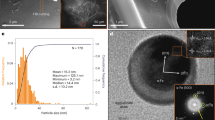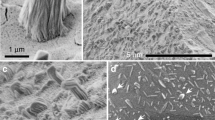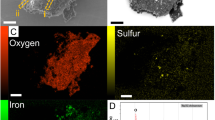Abstract
A UNIQUE type of meteoric iron fell at N'Goureyma, French West Africa, on June 15, 1900. It fills the 65th group of Brezina's classification1, “65. Breccia-like Octahedrite N'Goureyma group”, Obzg. Molten and drawn out Iron of the Zacatecas group". Brezina defined Zacatecas as “64. Breccia-like Octahedrite Zacatecas group, Obz. Octahedral nuggets breccia-like with globes of Troilite”.
This is a preview of subscription content, access via your institution
Access options
Subscribe to this journal
Receive 51 print issues and online access
$199.00 per year
only $3.90 per issue
Buy this article
- Purchase on Springer Link
- Instant access to full article PDF
Prices may be subject to local taxes which are calculated during checkout
Similar content being viewed by others
References
Brezina, A., Proc. Amer. Phil. Soc., Philadelphia, 43, 245 (1904).
Cohen, E., Amer. J. Sci., [iv], 15, 258 (1903).
Spencer, L. J., Min. Mag., 23, 387 (1933).
Spencer, L. J., Min. Mag., 25, 75 (1938).
Spencer, L. J., Min. Mag., 24, 13 (1935).
Author information
Authors and Affiliations
Rights and permissions
About this article
Cite this article
BEDFORD, R. The N'Goureyma Meteoric Iron. Nature 142, 1161–1162 (1938). https://doi.org/10.1038/1421161b0
Issue Date:
DOI: https://doi.org/10.1038/1421161b0
Comments
By submitting a comment you agree to abide by our Terms and Community Guidelines. If you find something abusive or that does not comply with our terms or guidelines please flag it as inappropriate.



